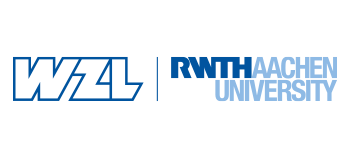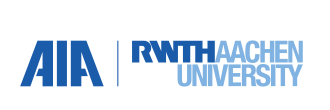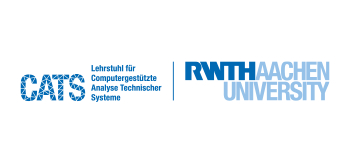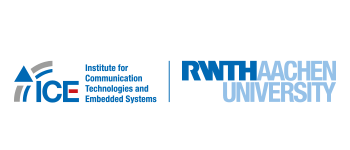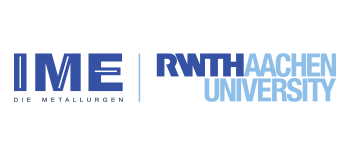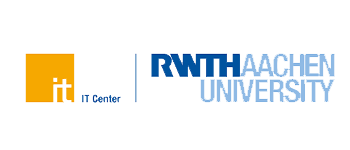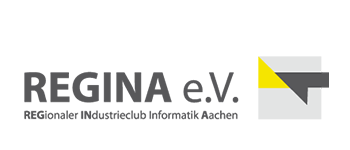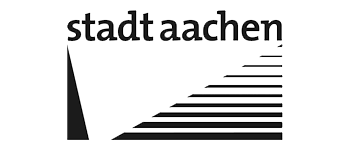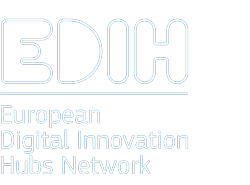CONSORTIUM & NETWORK
Our project participants and our partners

The Machine Tool Laboratory WZL at RWTH Aachen University promotes the innovative strength and competitiveness of industry with pioneering basic research, applied research and the resulting consulting and implementation projects in the field of production technology. In the research fields of machine tools, production systems, gear technology and information, quality and sensor systems in production, practical solutions for the rationalization of production are developed with industrial partners from a wide range of sectors.
The institute comprises experimental and numerical departments as well as a laboratory for biomedical flows. The facilities include several wind tunnels for subsonic, transonic and supersonic flows, water channels and a dedicated computational cluster. The scientific expertise relates to applied and fundamental development work in experimental and numerical fluid mechanics. The in-house flow solver m_AIA is a multiphysics PDE solver framework with which complex flow problems can be efficiently calculated on high-performance computers. The m_AIA simulation software is constantly being developed and optimized for high-performance computing (HPC) applications.
The research focus of the institute is on the development of numerical methods and modeling. The activities relate to the broad field of flowing media. The basis for this is the in-house flow solver. Work in recent years has focused in particular on the area of numerical shape optimization, in which the flow solver has become part of an optimization framework. The latter contains a geometry deformation based on T-splines as well as various optimization algorithms. So far, the framework has been applied to examples from profile extrusion and some medical devices. However, shape optimization is only as good as the underlying simulation. To further improve its quality, research has also been conducted into modeling the material behaviour of a wide variety of materials (such as thermoplastics or blood). In order to be able to simulate applications of this magnitude, we are dependent on highly parallel software, the development of which is also one of our research areas.
The digitalHUB Aachen association is committed to the digitalization of the economy and the public sector in the Aachen region. Its members are SMEs, industry, start-ups and institutions that support the association's goals. The digitalization center of the digitalHUB Aachen brings start-ups and IT SMEs (digital "enablers") together with traditional SMEs and industry as users (digital "users") in the digitalCHURCH in order to jointly develop and implement new digital business models. This is supported by the region and science ("supporters"). In this way, an "Aachen Area" is being created in the euregion as a digital innovation country. The digitalization center of digitalHUB Aachen is part of the "Digital Economy NRW (DWNRW)" initiative and one of five funded centers for the digital economy in North Rhine-Westphalia (NRW).
The FIR is a cross-industry research institute at RWTH Aachen University in the field of business organization and corporate IT with the aim of creating the organizational basis for the digitally networked industrial company of the future. By researching and transferring innovative solutions, the FIR contributes to increasing the competitiveness of companies in the areas of information, service and production management and business transformation. This takes place in the appropriate infrastructure for experimental organizational research with the direct participation of experts from industry. The focus is on industrial use cases (e.g. smart services). As a Johannes-Rau-Research-Institute, the FIR also supports the state's research strategy to strengthen NRW as a business location.
Fraunhofer FIT is an excellent partner for the human-centered design of our digital future. As a partner for digitalization, Industry 4.0 and the Internet of Things, the Fraunhofer Institute for Applied Information Technology FIT has been developing IT solutions that are tailored to people and fit seamlessly into business processes for almost 40 years. As a driver of innovation, it not only provides orientation, but also shapes digital change in the economy, environment and society. Around 350 scientists from the fields of computer science, social sciences, business administration and economics, psychology and engineering work in interdisciplinary teams to combine knowledge from information technology with questions and wishes from various areas of life. The Institute's strength lies in holistic system development - from validation of concepts to implementation. The strategic further development of its technological and application-specific expertise as well as its scientific excellence is aimed at market-relevant offers for customers from business and administration. The Human-Centered Engineering & Design (HCED) department at Fraunhofer FIT focuses on the development and design of interactive products and services - always with people at the center. Our expertise also includes the necessary organizational measures in company processes and the transfer of the necessary knowledge to those involved in the company. In digitalization projects - especially in the service of sustainability - we ensure that they take people's needs into account and can thus develop their potential appropriately with regard to a sustainable circular economy. For example, we use data rooms and artificial intelligence as tools for a needs-based digital transformation.
The Fraunhofer Institute for Production Technology IPT develops system solutions for the networked, adaptive production of sustainable and resource-conserving products and associated services. The focus is on process technology, production machines, production quality and measurement technology as well as technology management and ranges from the basics to the digital transformation of production. We develop and optimize new and existing methods, technologies and processes for the production of the future. In doing so, we understand production not only in its individual steps, but in the totality of all processes and connections between the links in the process chain. In this way, we develop both highly specialized individual technologies and complete system solutions for production on behalf of our customers. The clients and cooperation partners of the Fraunhofer IPT come from the entire manufacturing industry: from aerospace technology, the energy sector, automotive engineering and its suppliers in lightweight construction and toolmaking, machine tool construction, the precision engineering and optical industry as well as medical technology, biotechnology and pharmaceuticals. Around 535 employees currently work at the Fraunhofer IPT. We have an area of 9000 m² in Aachen. Around 5000 m² of this is used as laboratories and machine halls. Through the Fraunhofer Center for Manufacturing Innovation CMI in Boston, USA, we also offer our customers a sustainable technology transfer between European and American industry.
The Institute for Communication Technologies and Embedded Systems (ICE) deals with the design of software and hardware for application-specific computer and communication systems. The focus is on computationally intensive application areas such as mobile communications and automotive electronics. Our research contributes to improving performance, costs, energy efficiency and cyber security in these areas. Important basic technologies for this are tools for the design, programming and simulation of optimized microprocessors for signal processing algorithms and machine learning. The ICE has extensive experience in technology transfer from research to industry, in transfer-oriented EU projects such as TETRAMAX and HiPEAC and in IT spin-offs such as LISATek, Silexica and MachineWare.
The IME Institute at RWTH Aachen University is a pioneer in circular metallurgical processes with a strong focus on recycling, sustainability and upscaling technology. Our ongoing research is dedicated to developing innovative and sustainable methods to effectively manage metal-bearing waste, ultimately improving the supply of raw materials. At the heart of our work is expertise in extraction metallurgy, refining, electrolysis and recycling. IME is particularly characterized by its commitment to process design that is in line with circular economy principles and thus promotes sustainability goals. In line with our forward-thinking approach, we are at the forefront of research into digitalization, process simulation and data-driven modelling. By leveraging cutting-edge technologies, we are advancing recycling methods and revolutionizing the way we manage processes in line with our circular economy and sustainability goals. In addition, our dedication to upscaling technology ensures that our innovations have a significant and scalable impact on the industry and beyond.
Computer Science 11 - Embedded Software (I11) is a chair at RWTH Aachen University and part of the Faculty of Mathematics, Informatics and Natural Sciences. The focus of the chair is on the development and analysis of embedded systems and software in the areas of real-time systems, cyber-physical systems, artificial intelligence (AI) and software engineering with focus groups in the application areas of medical technology, mobility and industrial automation. The Chair I11 has already successfully collaborated with various industry and research partners as part of a large number of nationwide research projects. The chair also has interdisciplinary expertise through its focus groups. Here, the focus is particularly on data analysis and classification through the integration of AI methods. Overall, the chair offers broad expertise in the design and development of software and hardware to support digitalization in the Rhineland.
The IT Center is the central IT facility of RWTH Aachen University and is responsible for the IT support of university-wide processes. As an integral part of a technical university with a focus on teaching, research and infrastructure, the IT Center ensures the effective, efficient and secure operation of its IT infrastructure. The IT Center operates one of the fastest supercomputers in Germany for researchers at RWTH and the state of NRW, but also for students in the context of teaching. The High Performance Computing (HPC) working group offers further training and methodical support for the efficient use of the central high-performance computing facilities. In research and teaching, it deals with methods, tools and productivity of parallel programming and, in particular, performance and correctness analysis, for which the software package MUST is continuously being further developed. The IT Center of RWTH Aachen University operates the HPC systems and offers several types of support services for RWTH High Performance Computing. It provides user advice and offers technical and methodological support. Support requests can always be made via our service desk (single point of contact).
The Regionale Industrieclub Informatik Aachen (REGINA) e.V. is an association of over 130 regional IT companies, research and educational institutions. For over 30 years, the association has bundled the activities of the member institutions and strengthened cooperation in the areas of business, research and education. The main goal of REGINA is to expand and maintain the dialog between the company members, but also with the scientific community. Cooperation and communication within the network are intended to strengthen Aachen as a business location in the IT sector and achieve synergy effects. The profile of IT companies in the region is characterized by medium-sized companies. The companies represented here focus on the following areas: Industry software, technical applications/automation, hardware, controlling/optimization and infrastructure/Internet/eCommerce, communication and media manufacturing/production.
The City of Aachen's Department of Economics, Science, Digitalization and Europe advises and supports Aachen-based companies with a broad yet individually tailored portfolio of services. Its fundamental tasks include the networking of companies and university institutes at the location - but also in a regional and cross-border context - for the sustainable promotion of an innovative and dynamic business landscape and a practically relevant business location. The department supports Aachen-based companies on the path to digital and ecological transformation and acts as a driving force and networker in the local business and science location.
RWTH Innovation GmbH is the central, cross-university research and technology transfer unit of RWTH Aachen University. As a subsidiary of RWTH and UKA, it ensures a continuous exchange at the interfaces between research, industry and society through its active, integrated transfer approach. RWTH Innovation GmbH supports and accompanies researchers and inventors at RWTH Aachen University throughout the entire innovation process, from the idea to the market-ready technology. As part of its services for start-up teams, it offers precisely the support needed to turn innovative ideas into successful business models through targeted formats. It gives partner companies from industry direct access to the research and innovation landscape of RWTH Aachen University.
Das Manufacturing Technology Institute | MTI der RWTH Aachen entwickelt, gestaltet und steuert gemeinsam mit Forschungspartnern aus Industrie und Wissenschaft Prozesse und Fertigungsketten für eine zukunftsfähige, digitalisierte und nachhaltige Produktion. In Forschung und Lehre teilen wir mit engagierten Nachwuchskräften praxisnahe Erfahrungen und bieten vielfältige Möglichkeiten zur engen Zusammenarbeit mit produzierenden Unternehmen.

